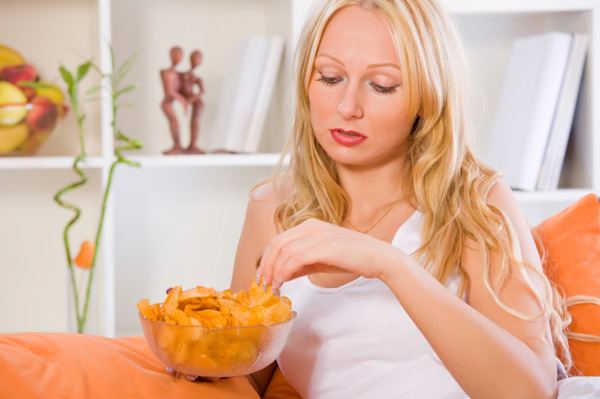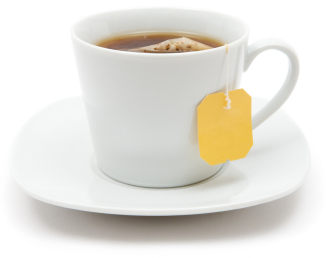Image may be NSFW.
Clik here to view.
Why do women turn to food for comfort?
Whether you grew up with a mom who gave you a cookie every time you got hurt or you developed a must-eat reflex out of loneliness, emotional eating is an automatic response to stress for many women. Albers says emotional eating is like a knee-jerk reaction that has developed due to repetition. "In other words, we've done it enough times to know it works quickly to calm and comfort ourselves," she explains. "If this sounds like you, don't feel bad. The majority of women have not been formally taught alternative ways to deal with feelings. There isn't a class in elementary school or high school that lays out what you do when you are stressed. The result: learn as you go."
The media is partly to blame for emotional eating
According to Albers, the connection between food and comfort is made quickly and is hard to break once established, especially because the media promotes this kind of coping mechanism. "How many times have you seen a woman eating ice cream on a sitcom or dramatic movie immediately post-breakup?" Albers asks. "Look closely at ads for chocolates and sweets. They sell the promise of emotional benefits, such as bliss, love, escape and feeling good. This media slant gives us the subtle perception that it is OK and 'normal' to comfort yourself with calories."
We are wired to eat when stressed
Before you beat yourself up or get mad at your mom for trying to make everything all better with food, consider your body’s biological response to stress. "Eating in response to emotion is a natural, hard-wired response that we all have," explains Albers. "We can thank the stress hormone cortisol for igniting cravings for sugary, fatty foods during moments of stress."
However, while emotional eating is a "natural response," Albers says it doesn't mean that eating is the only way to get your cortisol levels in check. She recommends soothing activities like relaxation, sleep, drinking hot tea and other non-food activities to help to rebalance your cortisol levels. "I liked the classic slogan, ‘Calgon, take me away’ [referring to the bubble bath commercial] because it is a perfect and rare example of an ad that actually taught women an alternative, healthy way to cope with stress."
Eating feels so good, so what’s the big deal?
Right now you may be thinking there is no way that anything could be more comforting than a giant warm cinnamon roll oozing with icing or a heaping plate of pasta carbonara, but Albers assures us that food is only a short-term solution to stress and can even be a factor in more stress in the long term. "Immediately food ‘works’ to comfort and soothe yourself — we wouldn't do it if it didn't give us benefits, right? But without another alternative, non-food coping mechanism, emotional eating can lead to excess weight gain." Some experts indicate that emotional eating is linked to 75 percent of overeating. So, for many women, just finding a way to cope with emotional eating will make a huge difference to their waistlines and health.
The benefits of non-food coping mechanisms
Food is readily accessible and seems to be the easiest way to escape from stress but it isn’t good for your emotional or physical health. Albers recommends learning calorie-free skills to cope with feelings as a way to dramatically improve your health and weight as well as give you life-long, guilt-free coping skills. "It can help you take charge of your emotions, which in turn, makes you feel confident and happier," Albers explains. "Let's face it, women have stressful lives and need healthy ways to cope all day long."
Up next: 10 Ways to soothe yourself without food >>
{pageBreak}
Image may be NSFW.
Clik here to view.
Give yourself a massage
Do you notice how you automatically start rubbing your temples when tension starts to rise? Albers says to take it a step further. "We naturally do self-massage, and intentionally and purposefully massaging tight spots can release feel-good chemicals in your body," she says. "Place a tennis ball under your foot and rub around. Or place the ball behind your shoulder blades and stand against the wall. It's an instant, cheap massage that can be done right at your desk or in the kitchen."
Try this guide to DIY massage for sore muscles >>
Have a cup of tea
Image may be NSFW.
Clik here to view.
Taking a break with a cup of black tea, which has zero calories, can reduce your cortisol levels by 47 percent, according to a study in the Journal of Psychopharmacology. Albers recommends The Republic of Tea chocolate teas for a stress-free sweet fix.
Get some sleep
According to Albers, sleep is critical to putting an end to emotional eating. "When you miss even a few hours of sleep, your appetite hormones are thrown off," the health expert explains. "Six to nine hours is optimal." Just as you schedule appointments and other events, be sure to schedule adequate sleep.
Top 10 seasonal sleeping tips >>
Chew gum
Keep a pack of sugarless gum in your purse and use it often. Not only is it good for your teeth, it can help you halt emotional eating. "A recent study in the journal Appetite indicates that chewing gum 15 minutes before you eat can significantly reduce your appetite and curb cravings," says Albers. "Brain scans show that it moves your brain into a ‘relaxed but alert’ state. Thus, it's great when you get the urge to boredom-eat."
Walk off the cravings
Breaking the emotional eating habit can be the hardest part of putting an end to it. Replace your response to eat when stressed with a response to exercise. Instead of reaching for a candy bar, lace up your shoes and go for a walk or do any other physical activity you enjoy. This may be especially helpful if your comfort food of choice is chocolate or other high-calorie snacks. "According to a study in the journal Appetite, taking a brisk walk for 20 minutes can help you curb chocolate cravings," adds Albers. Swapping out emotional eating with exercise also means you’ll boost your fitness level.
Try chew sticks
No, Albers doesn’t recommend stealing the Greenies from your pet, but she does encourage chew sticks for humans. "They look like toothpicks but are flavored and they can be purchased at natural health foods stores or online," she explains. "They help people lose weight and stop smoking. They allow you to crunch and chew without any calories. Straws can also help to alleviate oral fixations."
Change your eating behavior with worry beads
Worry beads have a long history of helping people cope with addictive behaviors, which can help you break the habit of reaching for food whenever you feel angst-ridden. "Keep worry beads in your hand and use them to work off nervous energy," says Albers, instead of wrapping your fingers around the first indulgent food you can find.
Rely on purposeful distraction
Are you a multitasker who not only emotionally eats but also does it while watching television, texting, talking on the phone or perusing Pinterest? Albers warns that distracted eating is a recipe for overeating but that distracting yourself from eating can curb your comfort-food cravings. "Engaging your mind in an activity that stimulates your brain but isn't too taxing, like simple word puzzles, knitting and other rhythmic activities, can soothe and calm you," she adds.
Relax like a rag doll
"Anxiety is at the heart of many of our mindless nibbles, says Albers. "To calm down your body, you can do a very simple relaxation exercise: Drop down your muscles as if you were a rag doll. Tense up your body and then assume the [rag-doll] position again. The contrast between tightening and relaxing can help unlock anxiety."
5 Practical ways to stress less >>
Breathe deep
Calming your physiological responses is key to reducing cortisol naturally. Imagine blowing through a straw as you exhale. Count to 10 on the slow, deep, in-breaths. Slowing down your breathing tricks your body into believing that it is going into sleep mode, thus signaling the rest of your body to just relax.
More on emotional eating
I can’t stop eating! How to stop emotional eating during the holidays
Weight gain: Are your emotions to blame?
Why women who diet often gain weight